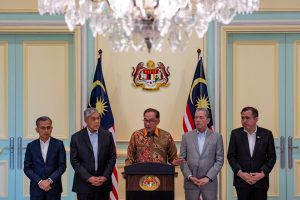Malaysian authorities have frozen the bank accounts of the country’s main opposition party as part of an anti-corruption investigation, the first sign of Prime Minister Anwar Ibrahim’s crusade against graft.
In a televised speech yesterday, the recently appointed leader announced that the Malaysian Anti-Corruption Commission (MACC) was investigating the provenance of around 300 million ringgit ($70.7 million) that had been found in the accounts of the political party Bersatu, which is led by former Prime Minister Muhyiddin Yassin.
“If these party leaders are as clean as they say they are, they must explain to investigators why, in such a short time, they were able to amass that much money,” Anwar said during the briefing.
According to a report by Free Malaysia Today, the investigation is “understood to have been taken in connection with an investigation into the alleged misappropriation of billions of ringgit meant for COVID-19 stimulus packages.” MACC Chief Commissioner Azam Baki confirmed to the paper that Bersatu’s accounts were frozen more than two weeks ago.
Shortly after taking office, Anwar announced that “tens of billions of ringgit” in COVID-19 relief during Muhyiddin’s time as premier was allocated without due procedure. He also mentioned, somewhat cryptically, that this involved companies with conflicts of interest, including familial links. Muhyiddin, who served as prime minister from March 2020 to August 2021, has denied any wrongdoing.
There is some irony, if no particular surprise, in the fact that Bersatu is under investigation for corruption. The party – full name Parti Pribumi Bersatu Malaysia – was founded in 2016 by former Prime Minister Mahathir Mohamad after he broke away from the ruling United Malays National Organization (UMNO), precisely because of the involvement of officials including his former protégé, Prime Minister Najib Razak, in the massive 1MDB corruption scandal. At the same time, corruption, particularly cronyism and kickbacks from government contracts, has long been the accompaniment to ethnic Malay patronage politics – a scourge that Anwar, during his long years in the wilderness of opposition, has pledged to tackle.
As one would expect, Bersatu claims that the investigation is politically motivated, with the party’s secretary-general Hamzah Zainudin asserting in a statement yesterday that the Anwar administration attempted to “divert the people’s attention from the weaknesses, failures, and practices of nepotism in their government.”
“Bersatu expresses its regret at the move by the PH-BN government to use a government agency as a tool to achieve its political goals by killing off the credibility of Bersatu and PN,” Hamzah said. However, Bersatu will cooperate in the probe, he said, “so that the slander against the party can be stopped immediately.”
While he has long-pledged to clean up Malaysian politics, Anwar insisted at his press conference yesterday that the MACC had acted independently in freezing Bersatu’s accounts under the Anti-Money Laundering, Anti-Terrorism Financing and Proceeds of Unlawful Activities Act.
Whatever the motivations, the investigation threatens to taint Bersatu’s Perikatan Nasional (PN) coalition with the corruption that has sent UMNO and the BN coalition, which ruled in an unbroken stretch from independence in 1957 until 2018, into an electoral tailspin. (BN won just 30 seats at last year’s general election, down from 79 in 2018 and 133 in 2013.)
Bersatu served in government from 2018 until the inconclusive general election of November 2022, when PN, which includes Bersatu and the Islamic party PAS, won the second-highest number of seats (74) after Anwar’s multiethnic Pakatan Harapan (PH) coalition (82). Indeed, PN’s surprising return was largely a result of its ability to capture Malay voters who had grown disillusioned with UMNO.
The current scandal, should it be substantiated, won’t help PN ahead of the six state elections due this year, when the coalition hopes to build on the gains it made in the general election.
Beyond that, the PN politicians can be expected to fight back. After former Prime Minister Najib Razak was arrested for his involvement in the 1MDB theft in 2018, he and other UMNO politicians responded by playing the race card: by attempting to paint the anti-graft investigation as a plot by the multiethnic PH government – particularly the predominantly ethnic Chinese Democratic Action Party (DAP) – to undermine Malay privileges and the status of Islam in Malaysian society.
It is conceivable that PN will adopt a similar line of attack ahead of this year’s state elections, especially given that PAS politicians have made similar accusations about the DAP since November’s election. But then, based on how PH was attacked by right-wing Malay elements during its short time in power from 2018 to 2020, these sorts of accusations were probably always going to be hurled in Anwar’s direction. Better, perhaps, to lean into the attacks.

































